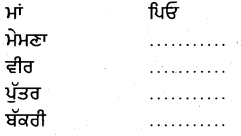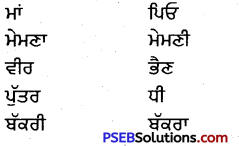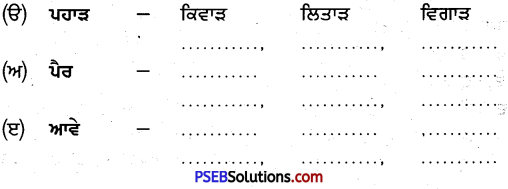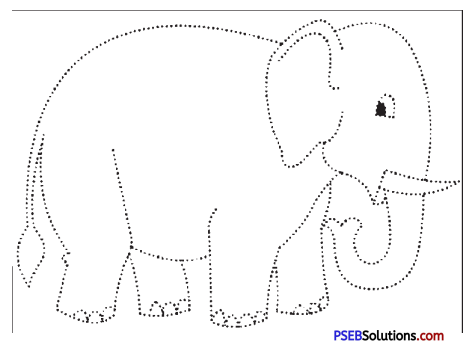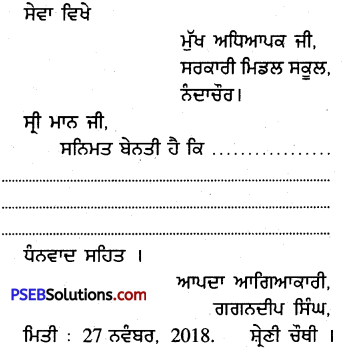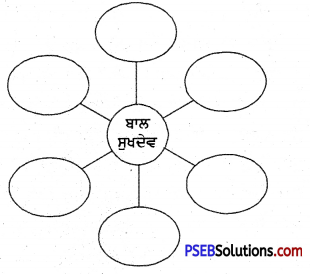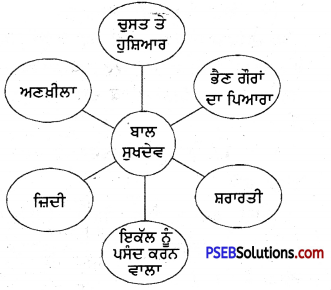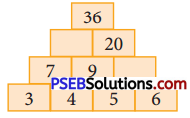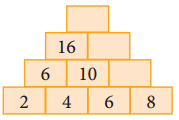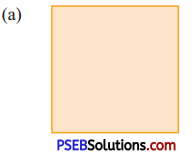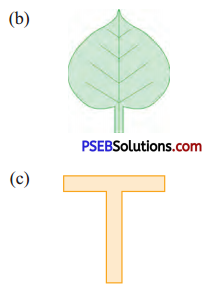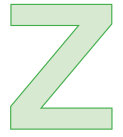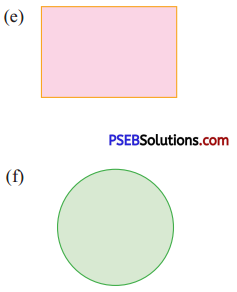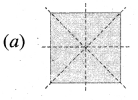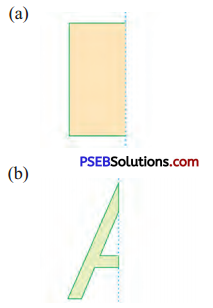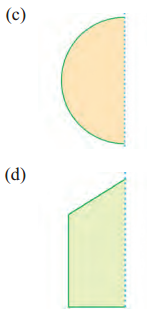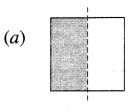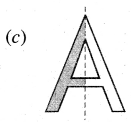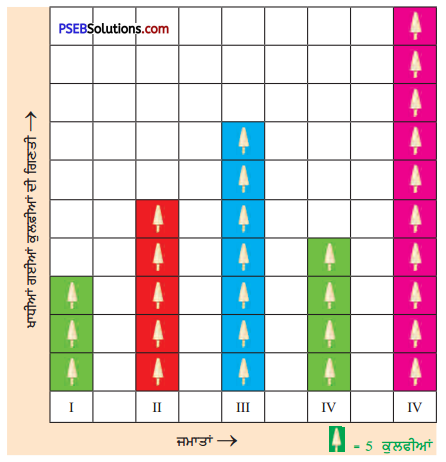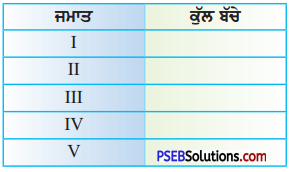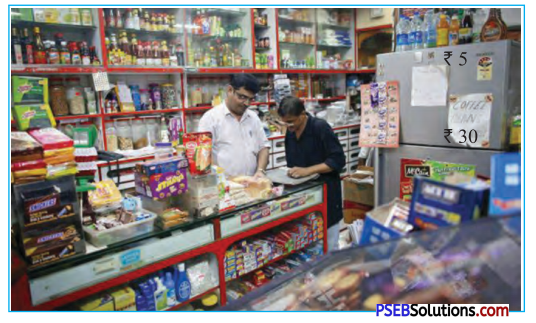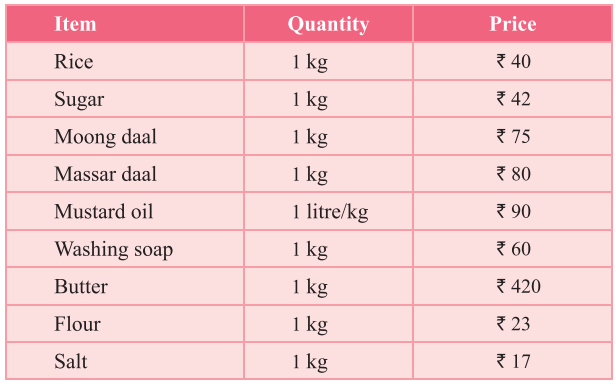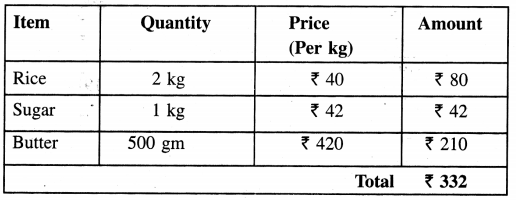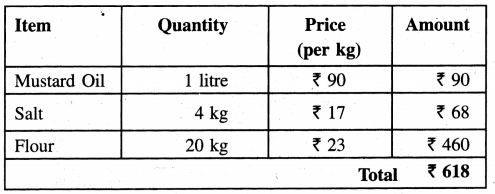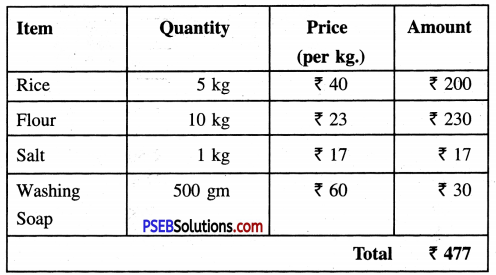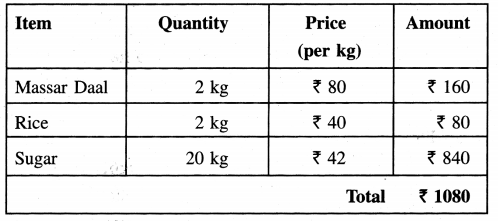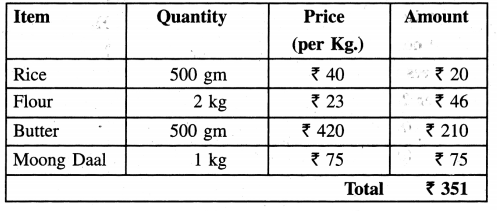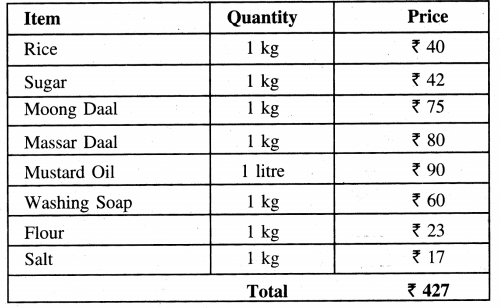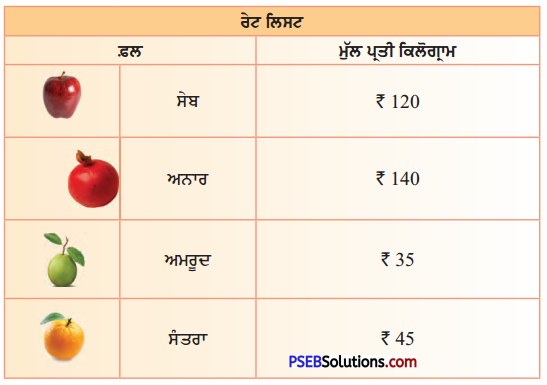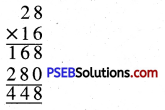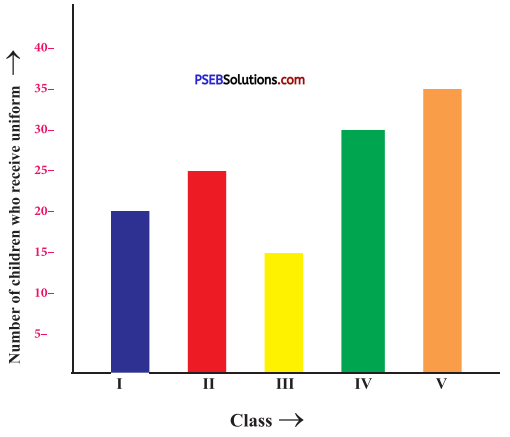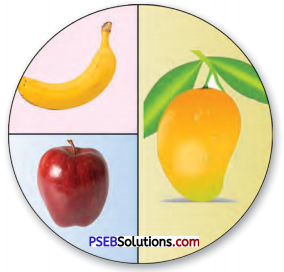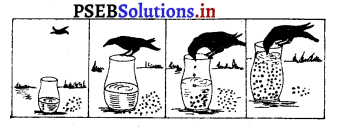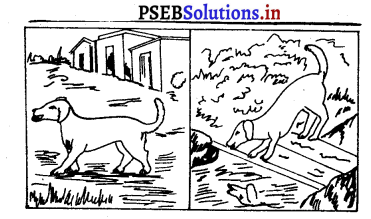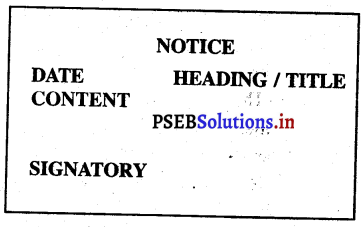Punjab State Board PSEB 4th Class Punjabi Book Solutions Chapter 1 ਪ੍ਰਾਰਥਨਾ Textbook Exercise Questions and Answers.
PSEB Solutions for Class 4 Punjabi Chapter 1 ਪ੍ਰਾਰਥਨਾ
ਕਾਵਿ-ਟੋਟਿਆਂ ਦੇ ਬਰਲ ਅਰਥ
(ਉ) ਸਿਰਜਣਹਾਰੇ, ਸਭ …… ਕੰਮ ਮਹਾਨ ।
ਸਰਲ ਅਰਥ-ਹੈ। ਸਾਰੀ ਦੁਨੀਆਂ ਨੂੰ ਬਣਾਉਣ ਵਾਲੇ ਪਰਮਾਤਮਾ, ਹੇ ਸਭ ਦੇ ਪਿਆਰੇ ਪ੍ਰਭੂ, ਸਾਨੂੰ ਇਹ ਦਾਨ ਦੇਹ ਕਿ ਅਸੀਂ ਬਹੁਤ ਪੜ੍ਹੀਏ ਲਿਖੀਏ । ਪੜ੍ਹ-ਲਿਖ ਕੇ ਤਰੱਕੀ ਕਰੀਏ ਅਤੇ ਵੱਡੇ-ਵੱਡੇ ਕੰਮ ਕਰੀਏ ।
(ਅ)ਤੇ ਮਾਨਵਤਾ ਦੀ …… ਅਰਾਮ ਹਰਾਮ ।
ਸਰਲ ਅਰਥ-ਹੇ ਪਰਮਾਤਮਾ, ਸਾਡੇ ਉੱਤੇ ਇਹ ਬਖ਼ਸ਼ਿਸ਼ ਕਰ ਕਿ ਅਸੀਂ ਸਾਰੇ ਮਨੁੱਖਾਂ ਦੀ ਸੇਵਾ ਕਰੀਏ । ਸੇਵਾ ਵੀ ਅਜਿਹੀ ਕਰੀਏ, ਜਿਸ ਦੇ ਬਦਲੇ ਅਸੀਂ ਕੁੱਝ ਵੀ ਪ੍ਰਾਪਤ ਕਰਨਾ ਨਾ ਚਾਹੀਏ ਅਸੀਂ ਹਰ ਸਮੇਂ ਤੁਰਦੇ ਰਹੀਏ ਤੇ ਆਪਣੇ ਨਿਸ਼ਾਨੇ ਉੱਤੇ ਪਹੁੰਚ ਜਾਈਏ । ਆਪਣੇ ਨਿਸ਼ਾਨੇ ਉੱਤੇ ਪਹੁੰਚਣ ਤੋਂ ਪਹਿਲਾਂ ਅਸੀਂ ਅਰਾਮ ਕਰਨ ਨੂੰ ਚੰਗਾ ਨਾ ਸਮਝੀਏ ।
(ਬ) ਤੂੰ ਦਾਤਾ ਹੈ …….. ਨਾ ਰੋਸਾ ।
ਸਰਲ ਅਰਥ-ਹੇ ਪਰਮਾਤਮਾ, ਤੂੰ ਸਭ ਨੂੰ ਦੇਣ ਵਾਲਾ ਹੈਂ । ਤੂੰ ਸਭ ਦਾ ਮਾਲਿਕ ਹੈਂ । ਤੂੰ ਸਾਰਿਆਂ ਦੇ ਮਨ ਵਿਚ ਇਹ ਗੱਲ ਪੈਦਾ ਕਰ ਕਿ ਉਹ ਸਾਰੇ ਤੇਰੇ ਵਿਚ ਭਰੋਸਾ ਰੱਖਣ ਸਾਰੇ ਇਕ ਦੂਜੇ ਨੂੰ ਪਿਆਰ ਕਰਨ ਤੇ ਕਿਸੇ ਦੇ ਮਨ ਵਿਚ ਦੂਸਰੇ ਲਈ ਗੁੱਸਾਗਿਲਾ ਨਾ ਰਹੇ ।
(ਸ) ਅੰਨ, ਧਨ ……. ਕੋਈ ਭੁੱਖਾ ।
ਸਰਲ ਅਰਥ-ਹੇ ਪਰਮਾਤਮਾ, ਤੂੰ ਅਜਿਹੀ ਬਖ਼ਸ਼ਿਸ਼ ਕਰ ਕਿ ਸਾਡੇ ਦੇਸ਼ ਵਿਚ ਪਹਿਲਾਂ ਨਾਲੋਂ ਦੂਣਾ ਸਵਾਇਆ ਅੰਨ ਤੇ ਧਨ ਹੋਵੇ । ਸਭ ਨੂੰ ਖਾਣ ਲਈ ਮਿਲੇ ਤੇ ਕੋਈ ਵੀ ਭੁੱਖਾ ਨਾ ਰਹੇ । ਜੇਕਰ ਕੋਈ ਕਿਸੇ ਨਾਲ ਗੱਲ ਕਰੇ, ਤਾਂ ਉਹ ਮਿੱਠਾ ਬੋਲ ਕੇ ਕਰੇ । ਕਦੇ ਵੀ ਕੋਈ ਆਦਮੀ ਕਿਸੇ ਨਾਲ ਰੁੱਖਾ ਨਾ ਬੋਲੇ ।
(ਹ) ਮੇਰ ਤੇਰ ਦੀਆਂ ……… ਦੀ ਖ਼ੁਸ਼ਬੋਈ ।
ਸਰਲ ਅਰਥ-ਹੇ ਪਰਮਾਤਮਾ, ਤੂੰ ਅਜਿਹੀ ਬਖ਼ਸ਼ਿਸ਼ ਕਰ ਕਿ ਬੰਦਿਆਂ ਵਿਚ ਮੇਰੇ ਤੇਰੇ ਦਾ ਫ਼ਰਕ ਮਿਟ ਜਾਵੇ ਤੇ ਉਨ੍ਹਾਂ ਵਿਚ ਕੋਈ ਹੰਕਾਰ ਨਾ ਰਹੇ ।ਇਸ ਤਰ੍ਹਾਂ ਸਭ ਮਨੁੱਖਾਂ ਵਿਚ ਅਜਿਹਾ ਪਿਆਰ ਬਣੇ ਕਿ ਇਸ ਤਰ੍ਹਾਂ ਲੱਗੇ, ਜਿਵੇਂ ਚਹੁੰਆਂ ਪਾਸਿਆਂ ਤੋਂ ਫੁੱਲਾਂ ਦੀ ਖ਼ੁਸ਼ਬੋ ਆ ਰਹੀ ਹੋਵੇ ।
(ਕ) ਜਦ ਵੀ ‘ਵਾਜ ਦੇਵੇ ਕੋਈ ਸਾਨੂੰ ……. ਸਮੇਂ ਦੀ ਪਾਈਏ ।
ਸਰਲ ਅਰਥ-ਹੇ ਪਰਮਾਤਮਾ, ਤੂੰ ਸਾਡੇ ਉੱਤੇ ਅਜਿਹੀ ਬਖ਼ਸ਼ਿਸ਼ ਕਰ ਕਿ ਜਦੋਂ ਵੀ ਕੋਈ ਬੰਦਾ ਕਿਸੇ ਕੰਮ ਜਾਂ ਮੱਦਦ ਲਈ ਅਵਾਜ਼ ਮਾਰੇ, ਅਸੀਂ ਉਸਦੇ ਕੰਮ ਆ ਸਕੀਏ । ਅਸੀਂ ਆਪਣੇ ਹਰ ਪਲ ਨੂੰ ਚੰਗੇ ਕੰਮਾਂ ਵਿਚ ਖ਼ਰਚ ਕਰੀਏ ਤੇ ਨਾਲ ਹੀ ਸਮੇਂ ਦੀ ਕਦਰ ਪਾਉਂਦੇ ਹੋਏ ਉਸਨੂੰ ਕਦੇ ਵਿਅਰਥ ਨਾ ਗੁਆਈਏ ।
![]()
ਬਹੁਤ ਸੰਖੇਪ ਉੱਤਰ ਵਾਲੇ ਪ੍ਰਸ਼ਨ
1. ਸਿਰਜਣਹਾਰੇ, ਸਭ ਦੇ ਪਿਆਰੇ,
ਦੇ ਸਾਨੂੰ ਇਹ ਦਾਨ ।
ਪੜ੍ਹੀਏ, ਲਿਖੀਏ, ਅੱਗੇ ਵਧੀਏ,
ਕਰੀਏ ਕੰਮ ਮਹਾਨ ।
ਪ੍ਰਸ਼ਨ
- ਸਿਰਜਣਹਾਰ ਕਿਸ ਨੂੰ ਕਿਹਾ ਗਿਆ ਹੈ ?
- ਦਾਨ ਕਿਸ ਤੋਂ ਮੰਗਿਆ ਗਿਆ ਹੈ ?
- ਕਿਹੜਾ ਦਾਨ ਮੰਗਿਆ ਗਿਆ ਹੈ ?
- ਕਿਹੜੇ ਕੰਮ ਕਰਨ ਦੀ ਮੰਗ ਕੀਤੀ ਗਈ ਹੈ ?
- ਉੱਪਰ ਲਿਖੀਆਂ ਸਤਰਾਂ ਨੂੰ ਸੁੰਦਰ ਲਿਖਾਈ ਕਰ ਕੇ ਲਿਖੋ ।
ਉੱਤਰ:
- ਪਰਮਾਤਮਾ ਨੂੰ ।
- ਪਰਮਾਤਮਾ ਤੋਂ !
- ਪੜ੍ਹਾਈ-ਲਿਖਾਈ, ਅੱਗੇ ਵਧਣ ਤੇ ਮਹਾਨ ਕੰਮ ਕਰਨ ਦਾ ਦਾਨ ।
- ਮਹਾਨ ।
- ਨੋਟ-ਵਿਦਿਆਰਥੀ ਆਪ ਹੀ ਲਿਖਣ ।
2. ਮਾਨਵਤਾ ਦੀ ਸੇਵਾ ਕਰੀਏ,
ਸੇਵਾ ਜੋ ਨਿਸ਼ਕਾਮ ।
ਤੁਰਦੇ ਜਾਈਏ, ਮੰਜ਼ਿਲ ਪਾਈਏ,
ਹੋਏ ਅਰਾਮ ਹਰਾਮ ।
ਪ੍ਰਸ਼ਨ
- ਕਿਸ ਦੀ ਸੇਵਾ ਦੀ ਗੱਲ ਕੀਤੀ ਗਈ ਹੈ ?
- ਕਿਹੋ ਜਿਹੀ ਸੇਵਾ ਦੀ ਗੱਲ ਕੀਤੀ ਗਈ ਹੈ ?
- ‘ਰਾਮ’ ਕਿਸ ਚੀਜ਼ ਨੂੰ ਕਿਹਾ ਗਿਆ ਹੈ ?
ਉੱਤਰ:
- ਮਾਨਵਤਾ ਦੀ ।
- ਨਿਸ਼ਕਾਮ ।
- ਅਰਾਮ ਨੂੰ ।
3. ਤੂੰ ਦਾਤਾ ਹੈਂ, ਸਭ ਦਾ ਮਾਲਿਕ
ਸਭ ਨੂੰ ਦੇਈਂ ਭਰੋਸਾ ।
ਸਭ ਹੀ ਪਿਆਰਨ ਇਕ-ਦੂਜੇ ਨੂੰ,
ਮਨ ਵਿਚ ਰਹੇ ਨਾ ਰੋਸਾ ।
ਪ੍ਰਸ਼ਨ
- ਦਾਤਾ ਕੌਣ ਹੈ ?
ਜਾਂ
ਸਭ ਦਾ ਮਾਲਕ ਕੌਣ ਹੈ ? - ਸਭ ਲਈ ਕੀ ਮੰਗਿਆ ਗਿਆ ਹੈ ?
- ਸਾਰੇ ਇਕ-ਦੂਜੇ ਨਾਲ ਕੀ ਕਰਨ ?
- ਮਨ ਵਿਚ ਕੀ ਨਾ ਰਹੇ ?
- ਉੱਪਰ ਦਿੱਤੀਆਂ ਸਤਰਾਂ ਨੂੰ ਜ਼ਬਾਨੀ ਯਾਦ ਕਰੋ ।
ਉੱਤਰ:
- ਪਰਮਾਤਮਾ ।
- ਇਕ ਦੂਜੇ ਵਿਚ ਭਰੋਸਾ ਤੇ ਇਕ ਦੂਜੇ ਲਈ ਪਿਆਰ ।
- ਪਿਆਰ ।
- ਰੋਸਾ ।
- ਨੋਟ-ਵਿਦਿਆਰਥੀ ਆਪੇ ਕਰਨ ।
![]()
4. ਅੰਨ, ਧਨ ਦੂਣ ਸਵਾਇਆ ਹੋਵੇ,
ਰਹੇ ਨਾ ਕੋਈ ਭੁੱਖਾ ।
ਬੋਲੇ ਬੋਲ ਤਾਂ ਮਿੱਠਾ ਬੋਲੇ
ਬੋਲੇ ਨਾ ਕੋਈ ਰੁੱਖਾ
ਪ੍ਰਸ਼ਨ
- ਕੀ ਦੂਣ-ਸਵਾਇਆ ਹੋਵੇ ?
- ਭੁੱਖਾ ਕੌਣ ਨਾ ਰਹੇ ?
- ਕਿਹੋ ਜਿਹੇ ਬੋਲ ਬੋਲੇ ਜਾਣ ?
- ਕੋਈ ਕਿਹੋ ਜਿਹਾ ਬੋਲ ਨਾ ਬੋਲੇ ?
ਉੱਤਰ:
- ਅੰਨ ਤੇ ਧਨ ।
- ਕੋਈ ਵੀ ਨਾ ।
- ਮਿੱਠੇ ।
- ਰੁੱਖਾ ।
5. ਮੇਰ ਤੇਰ ਦੀਆਂ ਗੱਲਾਂ ਮੁੱਕਣ,
ਹਉਮੈਂ ਰਹੇ ਨਾ ਕੋਈ ।
ਚਾਰ ਦਿਸ਼ਾਵਾਂ ਵਿਚੋਂ ਆਵੇ,
ਫੁੱਲਾਂ ਦੀ ਖ਼ੁਸ਼ਬੋਈ ।”
ਪ੍ਰਸ਼ਨ
- ਕਿਹੜੀਆਂ ਗੱਲਾਂ ਮੁੱਕ ਜਾਣ ?
- ਕਿਹੜੀ ਚੀਜ਼ ਨਾ ਰਹੇ ?
- ਚਾਰ ਦਿਸ਼ਾਵਾਂ ਵਿੱਚੋਂ ਕੀ ਆਵੇ ?
- ਚਾਰ ਦਿਸ਼ਾਵਾਂ ਕਿਹੜੀਆਂ-ਕਿਹੜੀਆਂ ਹਨ ?
ਉੱਤਰ:
- ਮੇਰ-ਤੇਰ ਦੀਆਂ ।
- ਹਉਮੈਂ।
- ਫੁੱਲਾਂ ਦੀ ਖੁਸ਼ਬੋਈ ।
- ਪੁਰਬ, ਪੱਛਮ, ਉੱਤਰ ਤੇ ਦੱਖਣ ।
6. ਜਦ ਵੀ ’ਵਾਜ ਦੇਵੇ ਕੋਈ ਸਾਨੂੰ,
ਕੰਮ ਉਸ ਦੇ ਆਈਏ !
ਹਰ ਪਲ ਆਪਣਾ ਲੇਖੇ ਲਾਈਏ,
ਕਦਰ ਸਮੇਂ ਦੀ ਪਾਈਏ ।
ਪ੍ਰਸ਼ਨ
- ਕਿਸ ਦੇ ਕੰਮ ਆਈਏ ?
- ਕਿਹੜੀ ਚੀਜ਼ ਲੇਖੇ ਲਾਈਏ ?
- ਕਾਹਦੀ ਕਦਰ ਪਾਈਏ ?
ਉੱਤਰ:
- ਜਿਹੜਾ ਵੀ ਅਵਾਜ਼ ਦੇਵੇ
- ਹਰ ਪਲ
- ਸਮੇਂ ਦੀ ।
ਪਾਠ-ਅਭਿਆਸ ਪ੍ਰਸ਼ਨ-ਉੱਤਰ
ਪ੍ਰਸ਼ਨ 1.
ਹੇਠ ਲਿਖੀਆਂ ਸਤਰਾਂ ਨੂੰ ਪੂਰਾ ਕਰੋ :-
(ੳ) ਸਿਰਜਣਹਾਰੇ ਸਭ ਦੇ ਪਿਆਰੇ,
ਦੇ ਸਾਨੂੰ ਇਹ ਦਾਨ ।
…………….
…………….
(ਅ) : ਤੂੰ ਦਾਤਾ ਹੈ, ਸਭ ਦਾ ਮਾਲਕ, ਤੇ ਸਭ ਨੂੰ ਦੇਈਂ ਭਰੋਸਾ ।
ਉੱਤਰ:
(ੳ) ਸਿਰਜਣਹਾਰੇ, ਸਭ ਦੇ ਪਿਆਰੇ,
ਦੇਹ ਸਾਨੂੰ ਇਹ ਦਾਨ ।
ਪੜ੍ਹੀਏ, ਲਿਖੀਏ, ਅੱਗੇ ਵਧੀਏ,
ਕਰੀਏ ਕੰਮ ਮਹਾਨ ।
(ਅ) ਤੂੰ ਦਾਤਾ ਹੈਂ ਸਭ ਦਾ ਮਾਲਕ,
ਸਭ ਨੂੰ ਦੇਈਂ ਭਰੋਸਾ ।
ਸਭ ਹੀ ਪਿਆਰਨ ਇਕ ਦੂਜੇ ਨੂੰ,
ਮਨ ਵਿਚ ਰਹੇ ਨਾ ਰੋਸਾ ।
![]()
ਪ੍ਰਸ਼ਨ 2.
ਇੱਕੋ ਜਿਹੇ ਤੁਕਾਂਤ ਵਾਲੇ ਸ਼ਬਦ ਲਿਖੋ :
- ਦਾਨ ….. …….. ……….
- ਨਿਸ਼ਕਾਮ ……. ……… ……….
- ਆਈਏ। ……. ….. …….
- ਕੋਈ …. ….. …..
ਉੱਤਰ:
- ਦਾਨ ‘ ਮਹਾਨ ਮਕਾਨ ਸ਼ਾਨ
- ਨਿਸ਼ਕਾਮ ਹਰਾਮ ਲਗਾਮ ਸ਼ਾਮ
- ਆਈਏ ਜਾਈਏ ਖਾਈਏ ਖਾਈਏ
- ਕੋਈ ਖ਼ੁਸ਼ਬੋਈ ਰੋਈ , ਰਸੋਈ
ਪ੍ਰਸ਼ਨ 3.
ਹੇਠ ਲਿਖੇ ਸ਼ਬਦਾਂ ਦੀ ਵਾਕਾਂ ਵਿਚ ਵਰਤੋਂ ਕਰੋ-..
ਦਾਨ, ਪਿਆਰੇ, ਮਹਾਨ, ਸੇਵਾ, ਅਰਾਮ, ਅੰਨ, ਮਾਨਵਤਾ, ਨਿਸ਼ਕਾਮ, ਰੁੱਖਾ, ਪਲ, ਕਦਰ, ਮਿੱਠਾ, ਮੰਜ਼ਿਲ ।
ਉੱਤਰ:
- ਦਾਨ ਦੇਣ ਦਾ ਕੰਮ-ਮੈਂ ਪਿੰਗਲਵਾੜੇ ਨੂੰ 500 ਰੁ: ਦਾਨ ਦਿੱਤੇ ।
- ਪਿਆਰੇ (ਜਿਨ੍ਹਾਂ ਨਾਲ ਪਿਆਰ ਹੋਵੇ)-ਬੱਚੇ ਸਭ ਨੂੰ ਪਿਆਰੇ ਲੱਗਦੇ ਹਨ ।
- ਮਹਾਨ (ਵੱਡਾ)-ਪੰਡਿਤ ਨਹਿਰੂ ਭਾਰਤ ਦੇ ਮਹਾਨ ਨੇਤਾ ਸਨ ।
- ਸੇਵਾ (ਦੇਖ-ਭਾਲ)-ਮਾਤਾ-ਪਿਤਾ ਦੀ ਸੇਵਾ ਕਰੋ ।
- ਅਰਾਮ (ਸੁਖ-ਸਾਨੂੰ ਆਪਣੇ ਮਾਤਾ-ਪਿਤਾ ਦੇ ਅਰਾਮ ਦਾ ਖ਼ਿਆਲ ਰੱਖਣਾ ਚਾਹੀਦਾ ਹੈ ।
- ਅੰਨ ਖਾਣ ਵਾਲੀ ਚੀਜ਼)-ਪੰਜਾਬ ਭਾਰਤ ਦਾ ਅੰਨ-ਦਾਤਾ ਹੈ ।
- ਮਾਨਵਤਾ (ਮਨੁੱਖਾਂ ਦੀ)-ਸਾਨੂੰ ਸਾਰੀ ਮਾਨਵਤਾ ਦਾ ਭਲਾ ਸੋਚਣਾ ਚਾਹੀਦਾ ਹੈ ।
- ਨਿਸ਼ਕਾਮ ਬਿਨਾਂ ਕਿਸੇ ਲਾਲਚ ਤੋਂ-ਦੇਸ਼ਭਗਤਾਂ ਨੇ ਦੇਸ਼ ਦੀ ਨਿਸ਼ਕਾਮ ਸੇਵਾ ਕੀਤੀ ।
- ਰੁੱਖਾ (ਕੌੜਾ, ਛਿੱਕਾ)-ਕਦੇ ਕਿਸੇ ਨਾਲ ਰੁੱਖਾ ਨਾ ਬੋਲੋ ।
- ਪਲ ਸਮੇਂ ਦਾ ਇਕ ਹਿੱਸਾ, ਚੌਵੀ ਸੈਕਿੰਡ ਦਾ ਸਮਾਂ-ਇਕ ਘੜੀ ਵਿਚ ਸੱਠ ਪਲ ਹੁੰਦੇ ਹਨ ।
- ਕਦਰ (ਕੀਮਤ)-ਸੱਸ ਨੂੰਹ ਦੇ ਕੀਤੇ ਕੰਮ ਦੀ ਕਦਰ ਨਹੀਂ ਕਰਦੀ ।
- ਮਿੱਠਾ ਕੌੜੇ ਦੇ ਉਲਟ, ਚੰਗਾ ਲੱਗਣ ਵਾਲਾ)-ਸਭ ਨਾਲ ਮਿੱਠਾ ਬੋਲੋ ।
- ਮੰਜ਼ਿਲ (ਨਿਸ਼ਾਨਾ, ਪਹੁੰਚਣ ਦੀ ਥਾਂ)-ਤੁਰਦੇ ਜਾਓ, ਹੌਲੀ-ਹੌਲੀ ਤੁਸੀਂ ਆਪਣੀ ਮੰਜ਼ਿਲ ਉੱਤੇ ਪਹੁੰਚ ਜਾਓਗੇ
ਪ੍ਰਸ਼ਨ 4.
ਪੜ੍ਹੋ ਤੇ ਲਿਖੋ-
ਸਿਰਜਣਹਾਰੇ, ਪਿਆਰੇ, ਪੜੀਏ, ਲਿਖੀਏ, ਮਹਾਨ, ਮਾਨਵਤਾ, ਨਿਸ਼ਕਾਮ, ਖੁਸ਼ਬੋਈ, ਹਉਮੈ, ਦਿਸ਼ਾਵਾਂ, ਸਵਾਇਆ, ਮੁੱਕਣਾ ।
ਉੱਤਰ:
(ਨੋਟ-ਵਿਦਿਆਰਥੀ ਆਪੇ ਪੜ੍ਹਨ ਤੇ ਲਿਖਣ ॥ .
ਪ੍ਰਸ਼ਨ 5.
‘ਪ੍ਰਾਰਥਨਾ ਕਵਿਤਾ ਨੂੰ ਜ਼ਬਾਨੀ ਯਾਦ ਕਰਕੇ ਗਾਉਣ ।
ਉੱਤਰ:
ਨੋਟ-ਵਿਦਿਆਰਥੀ ਆਪੇ ਕਰਨ ।
![]()
ਪ੍ਰਸ਼ਨ 6.
ਹੇਠ ਲਿਖੀਆਂ ਸਤਰਾਂ ਨੂੰ ਸੁੰਦਰ ਲਿਖਾਈ ਕਰ ਕੇ ਲਿਖੋ ।
ਜਾਂ
‘ਪ੍ਰਾਰਥਨਾ ਕਵਿਤਾ ਦੀਆਂ ਚਾਰ ਸਤਰਾਂ ਜ਼ਬਾਨੀ ਦੂ ਲਿਖੋ ।
ਤੂੰ ਦਾਤਾ ਹੈਂ, ਸਭ ਦਾ ਮਾਲਕ,
ਸਭ ਨੂੰ ਦੇਈਂ ਭਰੋਸਾ ।
ਸਭ ਹੀ ਪਿਆਰਨ ਇਕ ਦੂਜੇ ਨੂੰ,
ਮਨ ਵਿਚ ਰਹੇ ਨਾ ਰੋਸਾ ।
ਅੰਨਦਾਨ ਦੂਣ-ਸਵਾਇਆ ਹੋਵੇ,
ਰਹੇ ਨਾ ਕੋਈ ਭੁੱਖਾ ।
ਬੋਲੇ ਬੋਲ ਤਾਂ ਮਿੱਠਾ ਬੋਲੇ,
ਬੋਲੇ ਨਾ ਕੋਈ ਰੁੱਖਾਂ ।
ਉੱਤਰ:
(ਨੋਟ-ਵਿਦਿਆਰਥੀ ਆਪੇ ਹੀ ਲਿਖਣ ਤੇ ਯਾਦ ਕਰਨ |)

